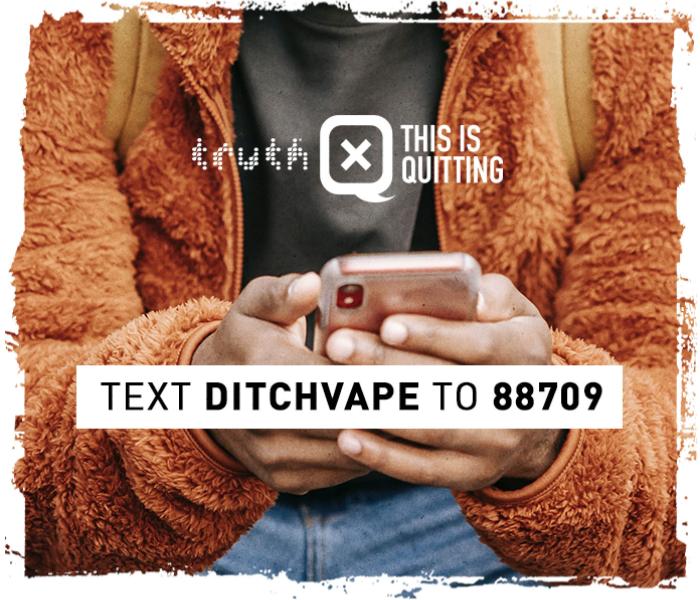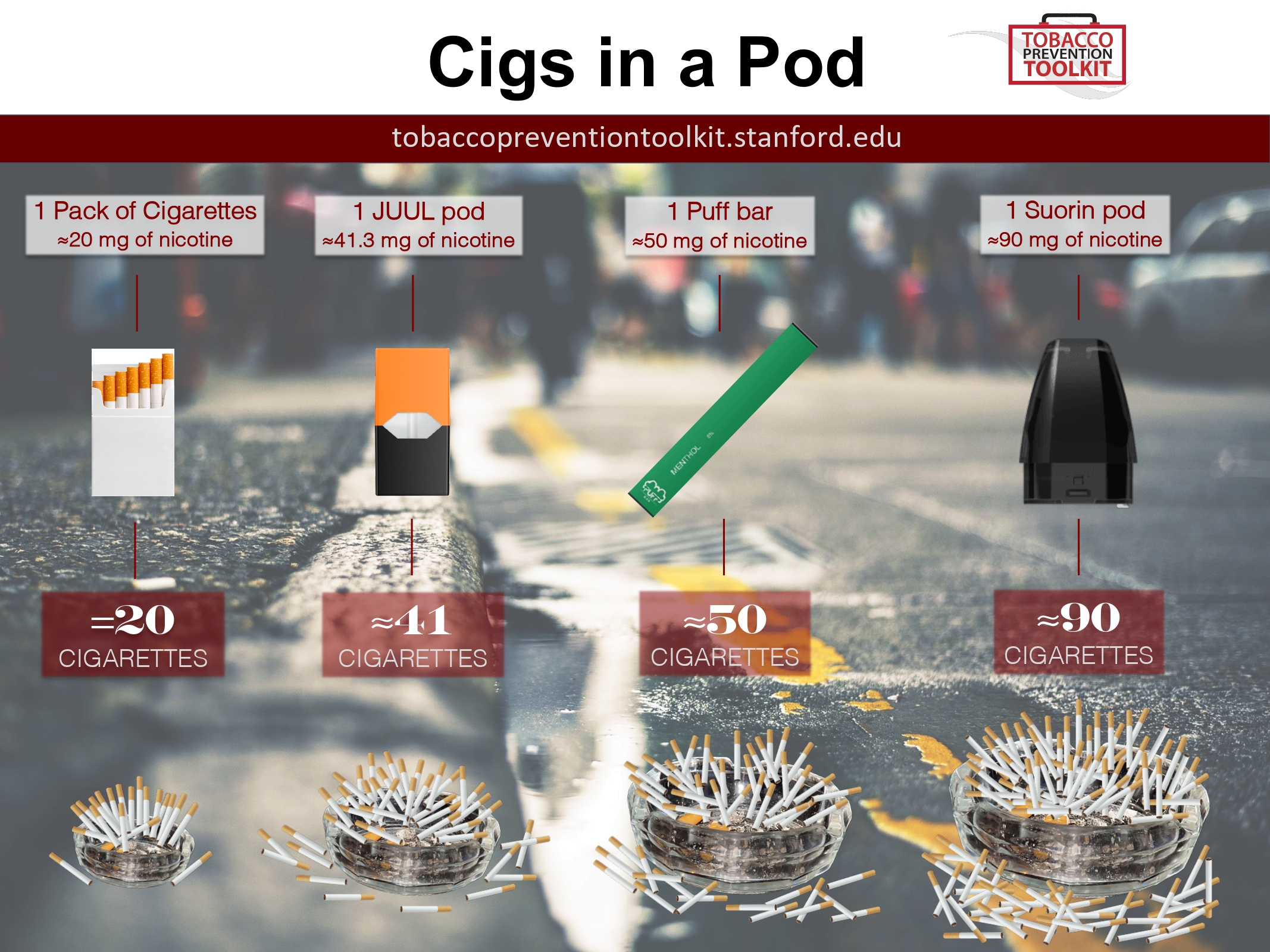- Tobacco Prevention and Control Home
- What's New
- Secondhand Smoke
- Youth Tobacco Prevention and Control Program
- Vapes and E-Cigs
- Tobacco Policy Tracking System
- Alabama Tobacco Quitline
- Quitline Materials
- Local Cessation Programs
- Project Staff
- Awareness Observances
- Tips From Former Smokers®
- Success Stories
- Healthcare Providers
- Medicaid Covered Services
- Enforcement
- Resources
- Data
- Contact Us
Vapes and E-Cigs
E-cigarettes, also known as e-cigs, vapes, vape pens, and electronic nicotine delivery systems (ENDS), are experiencing rapid growth in popularity, especially among teens and young adults. They come in a variety of forms, sometimes looking like USB flash drives, pens, and other items that make them hard for parents and teachers to spot.
 Text-to-Quit Vaping Service
Text-to-Quit Vaping Service
Youth and young adults who want to quit vaping are invited to text DITCHVAPE to 88709 to sign up for a totally free, anonymous texting service that provides 24/7 support, daily tips and motivation to keep you focused on your end goal. This service incorporates messages from young people who have attempted to quit, or successfully quit, e-cigarettes. Our messages show the real side of quitting, both the good and the bad, and recommend evidence-based tips and strategies to help you quit.
DITCHVAPE is part of This is Quitting, the text-to-quit vaping service that offers free, anonymous support for those seeking to quit vaping. Visit Truth Initiative to learn more about the This is Quitting campaign.
What You Need to Know
- Is vaping healtheir than smoking cigarettes? American Heart Association
- Nicotine is highly addictive and the primary agent in both regular cigarettes and e-cigarettes, and there’s nicotine in most flavored e-cigarettes.
Nicotine is Why Tobacco Products are Addictive (FDA) - E-cigarettes are the most commonly used tobacco product among youth.
About Electronic Cigarettes (E-Cigarettes) (CDC) - 85% of e-cigarette users reported currently using flavored products.
Results from the Annual National Youth Tobacco Survey (FDA) - E-Cigarettes are not safe for youth.
E-Cigarette Use Among Youth and Young Adults: A Report of the Surgeon General - 6,248 deaths in Alabama were attributed to smoking-related causes.
The Burden of Tobacco in Alabama (ADPH) - The tobacco industry spends $186.3 million on marketing each year in Alabama.
The Toll of Tobacco in Alabama (Campaign for Tobacco-Free Kids) - Vaping puts nicotine into the body. Nicotine is highly addictive and can slow brain development in teens and affect memory, concentration, learning, self-control, attention, and mood. Vaping also increases the risk of other types of addiction later in life.
Vaping: What You Need to Know (TeenHealth) - Nicotine is one of the five most addictive drugs according to WebMD.
The Five Most Addictive Drugs, and How You Can Get Help (WebMD) - E-Cigarettes produce a chemical-filled aerosol, not harmless “water vapor.”
E-Cigarette Use Among Youth and Young Adults: A Report of the Surgeon General - Chemicals are added to e-cigarettes for flavoring. Diacetyl, a chemical detected in many e-cigarettes, can cause severe lung disease when inhaled.
Flavoring Chemicals in E-Cigarettes (Environmental Health Perspectives)
FDA Policy on E-Cigarette Flavors
The U.S. Food and Drug Administration issued a policy on January 2, 2020, prioritizing enforcement against flavored e-cigarette products that appeal to kids, including fruit and mint flavors. Under this policy, companies that do not stop manufacturing, distributing and selling unauthorized flavored cartridge-based e-cigarettes (other than tobacco or menthol) within 30 days risk FDA enforcement actions.
The FDA intends to prioritize enforcement on the following groups of products:
- Any flavored, cartridge-based electronic nicotine delivery system (ENDS) product (other than a tobacco- or menthol-flavored ENDS product);
- All other ENDS products for which the manufacturer has failed to take (or is failing to take) adequate measures to prevent minors' access; and
- Any ENDS product that is targeted to minors or likely to promote the use of ENDS by minors.
Read more about the new FDA policy.
- FDA Proposes rules prohibiting menthol cigarettes and flavored cigars to prevent youth initiation, and significantly reduce tobacco-related disease and death. (April 28, 2022)
- Based on a law that took effect on April 14, 2022, the FDA can regulate tobacco products containing nicotine from any source.
Resources for Young People
- Campaign for Tobacco-Free Kids
- E-Cigarettes & Vaping: What Teens Should Know
- The Real Cost
- Signs and symptoms of Vaping Addiction
- SmokeFree Teen
- The Truth Campaign
- This Is Quitting
- Tips for Teens: The Truth About E-Cigarettes
 Resources for Parents
Resources for Parents
- E-Cigarettes and Vaping: Products Visual Dictionary
- E-Cigarettes and Vaping: What Parents Should Know
- E-Cigarettes and Youth: What Parents Need to Know
- E-Cigarettes Shaped Like USB Flash Drives
- Flavored E-Cigarettes Hook Kids
- Helping a Child Quit Vaping
- Helping Teens Quit
- Parents Against Vaping
- Talk to your Child About Vaping
- Talk with your Teen About E-Cigarettes: A Tip Sheet for Parents
- Tips on Talking to Your Kids
- Vaping: What You Need to Know
Resources for Teachers and Schools
- Commercial Tobacco-Free K-12 School Model Policy
- E-Cigarettes and Vaping: What Schools Should Know
- E-Cigarettes Shaped Like USB Flash Drives: Information for Parents, Educators and Health Care Providers
- The Real Cost of Vaping
Alabama Vape Laws
Act #2019-233, which went into effect in 2019, introduced major changes for retailers who advertise and/or sell alternative nicotine products, including vape devices and liquids, in the state of Alabama. These changes were geared toward limiting marketing that targets minors, as well as limiting minors' access to alternative nicotine products.
Currently:
- The sale of alternative nicotine products to anyone under the age of 21 is prohibited.
- The Alcohol Beverage Control Board is responsible for the regulation of e-cigarettes and vape products.
- Advertising cannot categorize alternative nicotine products as healthy options to replace smoking.
- Billboards advertising vaping liquid are limited to the advertisement of three flavors: tobacco, mint, or menthol.
- Vape shops are required to have a tobacco permit.
- Opening vape shops within 1,000 feet of a school, church, youth center, daycare center, or public library, playground or park is prohibited.
FDA Youth Tobacco Prevention Plan
FDA's Youth Tobacco Prevention Plan is a series of actions to stop youth use of tobacco products, especially e-cigarettes, with a special focus on three key areas:
- Preventing youth access to tobacco products
- Curbing marketing of tobacco products aimed at youth; and
- Educating teens about the dangers of using any tobacco product, including e-cigarettes, as well as educating retailers about their key role in protecting youth
For more information, visit the FDA Youth Tobacco Prevention Plan.
Alabama Tobacco Quitline
The Alabama Tobacco Quitline is a free telephone, text, and online coaching service for any Alabamian who is ready to quit tobacco or e-cigarette use. Contact the Quitline for more information.
Additional Resources
Page last updated: February 10, 2026




